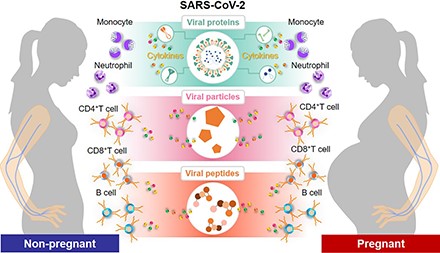-
Views
-
Cite
Cite
Nardhy Gomez-Lopez, Roberto Romero, Li Tao, Meyer Gershater, Yaozhu Leng, Chengrui Zou, Marcelo Farias-Jofre, Jose Galaz, Derek Miller, Adi L Tarca, Marcia Arenas-Hernandez, Gaurav Bhatti, Valeria Garcia-Flores, Zhenjie Liu, Robert Para, Tomi Kanninen, Ola Hadaya, Carmen Paredes, Yi Xu, Distinct Cellular Immune Responses to SARS-CoV-2 in Pregnant Women, The Journal of Immunology, Volume 208, Issue 8, April 2022, Pages 1857–1872, https://doi.org/10.4049/jimmunol.2101123
Close - Share Icon Share
Abstract
Pregnant women are at increased risk of adverse outcomes, including preeclampsia and preterm birth, that may result from severe acute respiratory syndrome coronavirus 2 (SARS-CoV-2) infection. Pregnancy imprints specific maternal immune responses that can modulate host susceptibility to microbial infection; therefore, recent studies have focused on the humoral response against SARS-CoV-2 in pregnant women. However, the pregnancy-specific cellular immune responses triggered by SARS-CoV-2 infection are poorly understood. In this study, we undertook an extensive in vitro investigation to determine the cellular immune responses to SARS-CoV-2 particles and proteins/peptides in pregnant women. First, we show that SARS-CoV-2 particles do not alter the pregnancy-specific oxidative burst of neutrophils and monocytes. Yet, SARS-CoV-2 particles/proteins shift monocyte activation from the classical to intermediate states in pregnant, but not in nonpregnant, women. Furthermore, SARS-CoV-2 proteins, but not particles or peptide pools, mildly enhance T cell activation during pregnancy. As expected, B cell phenotypes are heavily modulated by SARS-CoV-2 particles in all women; yet, pregnancy itself further modified such responses in these adaptive immune cells. Lastly, we report that pregnancy itself governs cytokine responses in the maternal circulation, of which IFN-β and IL-8 were diminished upon SARS-CoV-2 challenge. Collectively, these findings highlight the differential in vitro responses to SARS-CoV-2 in pregnant and nonpregnant women and shed light on the immune mechanisms implicated in coronavirus disease 2019 during pregnancy.





